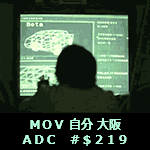|
Sadi posted:Is ford still using as400? God I hate that program.
|
|
|
|

|
| # ? May 31, 2024 05:37 |
|
Sadi posted:Is ford still using as400? God I hate that program. Hahahaha the whole loving car world is still on AS/400.
|
|
|
|
Yeah, uh... I work on zOS. Old school IBM stuff ain't going anywhere fast.
|
|
|
|
Phone posted:Yeah, uh... I work on zOS. poo poo, I've worked on sites where they were so chained to their as400 accounting software that they were running an as400/i-series emulator that you accessed via a some proprietary terminal emulator that you accessed via a windows terminal server. So gross.
|
|
|
|
Everyone should have a keyboard with F1-F24 JCL4LIFE(ofyourchassis)
|
|
|
|
Sadi posted:Is ford still using as400? God I hate that program. gently caress as400, we use that at Manheim gently caress it until dead then continue loving it
|
|
|
|
One of the hospitals here was running on a Unisys series A mainframe until 2012. Lots of industries still use old poo poo because it's proven. Ask me about the special hell that is MUMPS.
|
|
|
|
TKIY posted:Ask me about the special hell that is MUMPS. Wouldn't you say its positively Epic?
|
|
|
|
LeftistMuslimObama posted:poo poo, I've worked on sites where they were so chained to their as400 accounting software that they were running an as400/i-series emulator that you accessed via a some proprietary terminal emulator that you accessed via a windows terminal server. So gross. My work is primarily done through a 3270 emulator. Yeahhhhhhhhhhhhhhhhhhhhhhh.
|
|
|
|
Brigdh posted:Wouldn't you say its positively Epic? As someone who had a fleeting relationship with that company: thanks for bringing back some awful memories.
|
|
|
|
TKIY posted:One of the hospitals here was running on a Unisys series A mainframe until 2012. Lots of industries still use old poo poo because it's proven. code:code:
|
|
|
|
..and now we know where Larry Wall came up with his concept of syntax.
|
|
|
|
West SAAB Story posted:..and now we know where Larry Wall came up with his concept of syntax. MUMPS was the fever dream of a madman who was trying to design "the perfect language for programming hospital systems". The epoch is some random date in the late 1800s because he picked the birthday of the oldest living American at the time and then tacked on 10 years or so just in case. If you're wondering what that $O thing is, it's a built in level-order iterator on a g-tree. Because the only things in MUMPS are strings and g-trees. Arrays are just g-trees that you have chosen to assign numerical subscripts to. Good luck optimizing anything kids, no hashtables for you!
|
|
|
|
So, he just wanted to show off his Big O face, you're saying? Jesus. The more I look at references, the more beautifully broken it is.
|
|
|
|
LeftistMuslimObama posted:
loving SEIZURES RIGHT NOW
|
|
|
|
In news that shouldn't really be surprising to anyone, The Z/28 sold out. Yeah they're only doing 500 of them, but there was a whole lot of "who would pay that much for a Camaro!" out there.
|
|
|
|
fknlo posted:In news that shouldn't really be surprising to anyone, The Z/28 sold out. Yeah they're only doing 500 of them, but there was a whole lot of "who would pay that much for a Camaro!" out there. goddammit Monticello, open to the loving public 
|
|
|
|
Haha holy poo poo:quote:the car comes standard with a single speaker to comply with safety regulations requiring the turn signal tick to play over an audio system.
|
|
|
|
Wow, I too love to pay more to get less. Curse Porsche for making that a business model. This kinda poo poo just further entrenches me in the Mustang or Challenger camp.
|
|
|
|
No see you're paying for the rarity it totally makes sense submarines AMERICAN STEEL FREEDOM EAGLE 
|
|
|
|
So this might belong in the stupid question thread, but since it's also about engine development, I'll ask here: Why are turbochargers so much more popular than superchargers?
|
|
|
|
blk posted:So this might belong in the stupid question thread, but since it's also about engine development, I'll ask here: More horsepower, better fuel economy. Traditional (Roots) blowers make most of their boost at low-mid RPMs, but tap out at higher RPMs (and due to how HP is calculated - torque * RPM / 5252), which results in lower horsepower figures (but much flatter torque curves) than a turbo pushing the same PSI of boost. Roots blowers also aren't as efficient once you exceed ~8-10 PSI of boost - once plenum pressure gets past a certain point, there's too much leakage past the rotors and you will just generate extra heat with no additional boost. Centrifugal blowers (which are essentially the cold side of a turbo with a pulley on it) can generate the same boost pressures as a turbo, but only at mid-high RPMs since the amount of boost is directly related to engine speeds. They're also somewhat of a newer thing in the tuning world, so not as many companies make them. The ideal blower is a twin-screw, which gives low rev grunt off idle like a Roots (it too is a positive displacement design), but without the heat or leakage problems a Roots has, so it can blow more boost (depending on the design and engine, you can boost past 20 PSI, something no Roots will do), and also provides a good amount of boost even at higher RPMs. The downside to twin-screws is that they're very pricy; only a couple companies make them, and they have very tight tolerances to manufacture. Modern turbos often have little or no lag, give good boost even at low speeds (often as low as 1800 rpm), and don't cause parasitic losses from being driven off the engine all the time - they only eat into your fuel efficiency when you're getting on the throttle, at cruise they have a negligible impact on economy.
|
|
|
|
blk posted:So this might belong in the stupid question thread, but since it's also about engine development, I'll ask here: Superchargers are parasitic and sap power to make power. Advancements in ECUs and fun stuff like variable geometry turbos and material sciences make it possible that you can have a relatively high compression engine with a turbo on it. Also, you can make poo poo like 3 cylinders and 4 cylinders have V8 like torque: just one solid line from 1500rpm to 6000rpm. Phone fucked around with this message at 05:02 on Apr 25, 2014 |
|
|
|
Kraftwerk posted:Wow, I too love to pay more to get less. I know. Can you believe how much they're charging over the other Camaro with the LS7 and ceramic brakes?
|
|
|
|
fknlo posted:I know. Can you believe how much they're charging over the other Camaro with the LS7 and ceramic brakes? Haha yeah, I mean before now all you could get was 6-piston Brembos and an LSA with 80 more horsepower, and that's a way more expensive option. Wait did I say more expensive? I meant $20,000 cheaper
|
|
|
|
HotCanadianChick posted:More horsepower, better fuel economy. Traditional (Roots) blowers make most of their boost at low-mid RPMs, but tap out at higher RPMs (and due to how HP is calculated - torque * RPM / 5252), which results in lower horsepower figures (but much flatter torque curves) than a turbo pushing the same PSI of boost. Roots blowers also aren't as efficient once you exceed ~8-10 PSI of boost - once plenum pressure gets past a certain point, there's too much leakage past the rotors and you will just generate extra heat with no additional boost. Roots superchargers are making a comeback, GM, Jaguar and Ford are using them on their hi-po V8s, Dodge will probably have a supercharged 6.4l, Jag and VAG are also using them on their V6s, Nissan has a few too on the hybrid engines, and Volvo is also using one on their new generation of I4s. The following are the reasons: The current generation of Roots superchargers are much better than the older type. Probably very close to the twin screw types in terms of efficiency. Unlike other types, the Rootes type supercharger pretty much doesn't use any extra fuel or power when not boosting, because they have a bypass valve that opens up and just lets air through when the RPMs are low. This is especially in contrast to the twin screw type, which because it actually compresses air within the screws, is always boosting. The cars that used twin screw superchargers (old Mercedes E55 AMG and others that used the same engine, Ford GT) all got ridiculously poor fuel economy as a result and another reason why pretty much no one uses them from the factory anymore. They sure were fast though! The other reason is really just packaging which is a bigger deal than you think. Since V8s are mostly 90* Vs, turbocharging V8s is a bit tricky while putting a supercharger in the valley of the V is very simple, so most supercharging applications are V8s. A 90* V6 is the same way, but few companies make 90* V6s anymore except for VW/Audi hence why they also have a supercharged V6. I guess the new Jag engine is a 90* too but I dunno. The T in 3.0T stands for "thupercharged". On most other engine types the packaging is at best about the same as turbocharging and usually more difficult. Throatwarbler fucked around with this message at 05:46 on Apr 25, 2014 |
|
|
|
Fucknag posted:Haha yeah, I mean before now all you could get was 6-piston Brembos and an LSA with 80 more horsepower, and that's a way more expensive option. And $20,000 slower. http://www.motortrend.com/roadtests/coupes/1403_chevrolet_camaro_z28_porsche_911_turbo_s_nissan_gt_r_comparison/?fullsite=true
|
|
|
|
Fucknag posted:Haha yeah, I mean before now all you could get was 6-piston Brembos and an LSA with 80 more horsepower, and that's a way more expensive option. You're pretty angry about other people spending their own money buying cars they like.
|
|
|
|
Throatwarbler posted:You're pretty angry about other people spending their own money buying cars they like. And you're ascribing a bit too much care to me. You're move, sir. Really, though, I'm sure it's a fine car, just not sure it'd be the one I bought if it were my money. Wait, err, let me do the Clarkson thing: IT RATTLES AT EVERY CORNER AND THE PANEL FITMENT IS WIDER THAN THE GRAND CANYON AND THE FUEL ECONOMY IS DREADFUL AND THE STEERING WHEEL IS ON THE WRONG SIDE AND IT'S FLASHIER THAN A CHELSEA TRACTOR AND THAT'S WHY YOU'RE ABSOLUTELY STONE-DEAD STUPID IF YOU DON'T BUY ONE
|
|
|
|
Throatwarbler posted:The other reason is really just packaging which is a bigger deal than you think. Since V8s are mostly 90* Vs, turbocharging V8s is a bit tricky while putting a supercharger in the valley of the V is very simple, so most supercharging applications are V8s. A 90* V6 is the same way, but few companies make 90* V6s anymore except for VW/Audi hence why they also have a supercharged V6. I guess the new Jag engine is a 90* too but I dunno. The T in 3.0T stands for "thupercharged". A slightly more generalized version of this is that overall, turbos work better on small-displacement, high-revving engines (these days, I-4s and sometimes I-3s and stuff) while superchargers are more suited to big-inch and lower RPM, usually V-8s and beyond. Both add cost and complexity. Right now it's still easy to get competitive power at the big end out of a NA V-8, but getting acceptable power, drivability and especially fuel economy (as mandated by law) out of a really low-dispacement engine in a real-sized car is tricky. So the money and the R&D is going to putting turbos on small-displacement engines right now.
|
|
|
|
Snowdens Secret posted:A slightly more generalized version of this is that overall, turbos work better on small-displacement, high-revving engines (these days, I-4s and sometimes I-3s and stuff) while superchargers are more suited to big-inch and lower RPM, usually V-8s and beyond. Both add cost and complexity. Right now it's still easy to get competitive power at the big end out of a NA V-8, but getting acceptable power, drivability and especially fuel economy (as mandated by law) out of a really low-dispacement engine in a real-sized car is tricky. So the money and the R&D is going to putting turbos on small-displacement engines right now. The small-displacement segment is where the really cool poo poo is happening right now: http://www.gizmag.com/nissan-zeod-rc-engine/30611/ 400hp and 380nm from a 40kg 1.5L 3-cylinder, small enough to fit as carry-on luggage.
|
|
|
|
this might sound like a stupid question but: Given how commonplace automatic transmissions of various flavours are, especially in the North American market, it seems they can't be that much more expensive to produce, especially given the volume, compared to a manual transmission. Could it be that in certain circumstances, due to tooling and volume etc., that the manual transmission is actually more expensive to produce? In the UK, where manual is still the "standard" option, and automatics are an expensive upgrade, could that difference in production cost actually mean that in some cases the base model manual transmission is actually a more expensive car to build than the upgraded automatic, but the margins on upselling the auto more than make up for it? Or is that all just a load of speculative crap with no bearing on reality because manuals are vastly cheaper to build?
|
|
|
|
HotCanadianChick posted:And $20,000 slower. Yeah, the other Camaros can't compete wtih the Z/28 on the track, like, AT ALL. Meanwhile the Z/28 can equal or beat cars that are VASTLY more expensive. I personally wouldn't buy one, but treating it like a joke is dumb as poo poo. It accomplishes exactly what it set out to do very well.
|
|
|
|
Linedance posted:this might sound like a stupid question but: Sellers charge what buyers are willing to pay. The cost matters only in that they won't sell you something for below what it costs them to build, or rather they won't build something if they figure people aren't willing to pay at least what it costs to build plus markup.
|
|
|
|
Linedance posted:this might sound like a stupid question but: Its not a stupid question, and i think the economics behind it are quite complex. For many cars, i suspect the sole reason for an manual option to exist is to give a lower base price, and charge for the not really optional automatic. An example could bee the Mercedes E-class that is offered with a manual transmission in Europe, although probably less than 2% of cars sold is so equipped. R&D costs for the manual probably heavily outweighs the loss of customers because of no manual option, but thy can offer a lower base price to lure in customers. After the sunk cost of R&D is considered, i think the per unit cost of manual transmissions will pretty much always be lower. More news related, Ford is heavily featuring the new Mustang on their European websites, and will do a pre-order promotion during the champions league soccer finals. Although my country (Norway) is probably one of the most hostile tax-wise towards the idea of cheap, high-powered sportscars , i struggle to see how there is a business case for the Mustang in Europe, especially considering the R&D invested to make it "global" like the IRS and 2.3 ecoboost. Is cars like the Genesis Coupe or 370Z selling in any number in other European markets? I don't know if the AmCar Enthusiasts are as prevalent in other markets either but I can imagine the association to be negative for quite a large percentage of potential buyers of expensive sports cars(probably more than $100K here)
|
|
|
|
Humbug posted:Its not a stupid question, and i think the economics behind it are quite complex. For many cars, i suspect the sole reason for an manual option to exist is to give a lower base price, and charge for the not really optional automatic. An example could bee the Mercedes E-class that is offered with a manual transmission in Europe, although probably less than 2% of cars sold is so equipped. R&D costs for the manual probably heavily outweighs the loss of customers because of no manual option, but thy can offer a lower base price to lure in customers. After the sunk cost of R&D is considered, i think the per unit cost of manual transmissions will pretty much always be lower. It seems very unlikely that they were going to retain the live axle on the 2015 even if it wasn't being sold in Europe. Similarly the 2.3l engine is being used in all kinds of other products. Yes Norway is an expensive market for cars. It's also tiny. When people talk about Western Europe they are really just talking about Germany, France, Britain and Italy. Ford has always had a big footprint in Britain and IIRc does respectably well in Italy. Cars aren't that expensive in Britain so it will probably work out OK.
|
|
|
|
Fucknag posted:And you're ascribing a bit too much care to me. You're move, sir. Huh, didn't know clarkson was a goon
|
|
|
|
Throatwarbler posted:It seems very unlikely that they were going to retain the live axle on the 2015 even if it wasn't being sold in Europe. Similarly the 2.3l engine is being used in all kinds of other products. Fair point on the R&D stuff, and Ford does fine all over Europe (Norway included). It's more that the mustang is a very different car to the ones they sell already. It just seems to me like the market for fairly powerful sportscars (ie not faster versions of normal cars) from non-premium producers seems marginal compared to the US. The Genesis coupe isn't sold in any European market as far as I know, and the sales of the 370Z seems marginal. The Camaro is also sold in some markets with not much success. http://left-lane.com/european-car-sales-data/nissan/nissan-370z/ I am just not sure it is worth making any compromises that would make it less competitive in the all-important US market to make it global. If it isn't compromised, then i guess it doesn't hurt to try.
|
|
|
|
Humbug posted:Fair point on the R&D stuff, and Ford does fine all over Europe (Norway included). It's more that the mustang is a very different car to the ones they sell already. It just seems to me like the market for fairly powerful sportscars (ie not faster versions of normal cars) from non-premium producers seems marginal compared to the US. The Genesis coupe isn't sold in any European market as far as I know, and the sales of the 370Z seems marginal. The Camaro is also sold in some markets with not much success.
|
|
|
|

|
| # ? May 31, 2024 05:37 |
|
You should get use to more vehicle exports from the US as a trend in the future. Cheap energy and currency manipulation will do that. http://online.wsj.com/news/articles/SB10001424127887324577904578559933968739000 quote:
|
|
|






























